-
1 of 253523 objects
'Fire-Bearer' ( 1605-27
Steel, gold, copper, wood, leather | 93.0 cm (length) | RCIN 67062
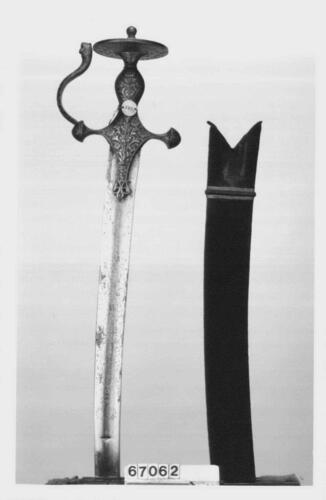
Attributed to Mughal Workshop
67062.jpg 1605-27
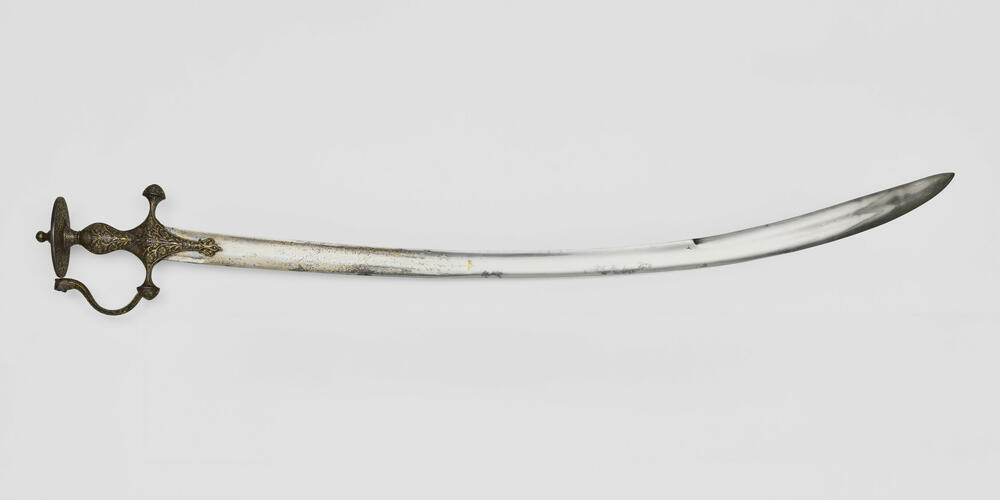

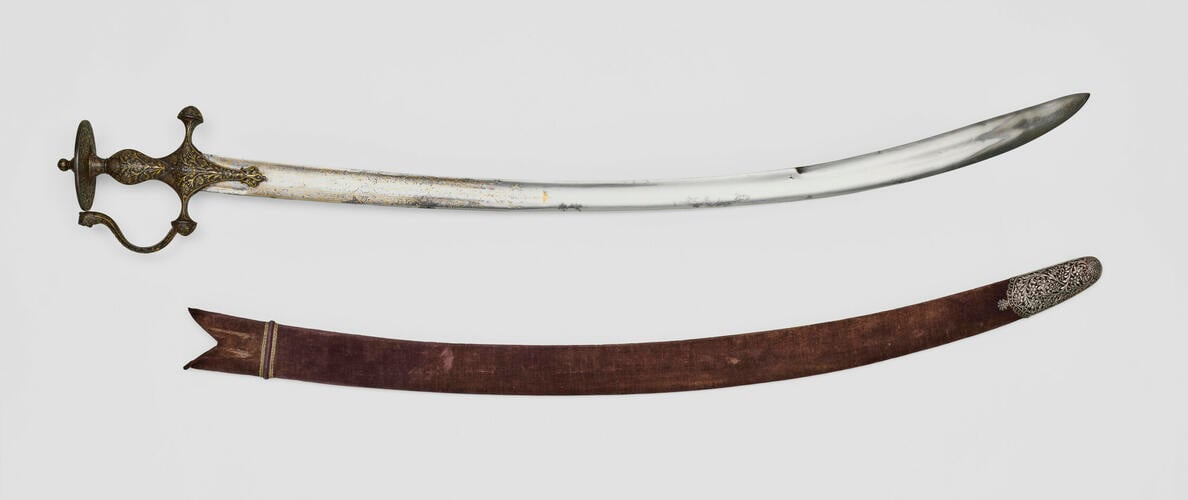
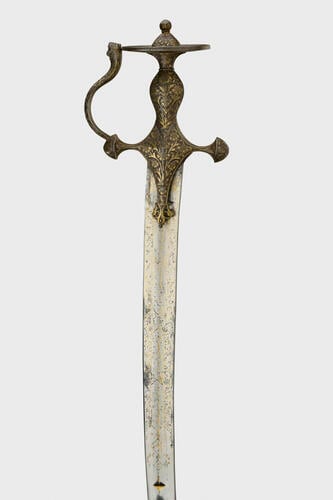



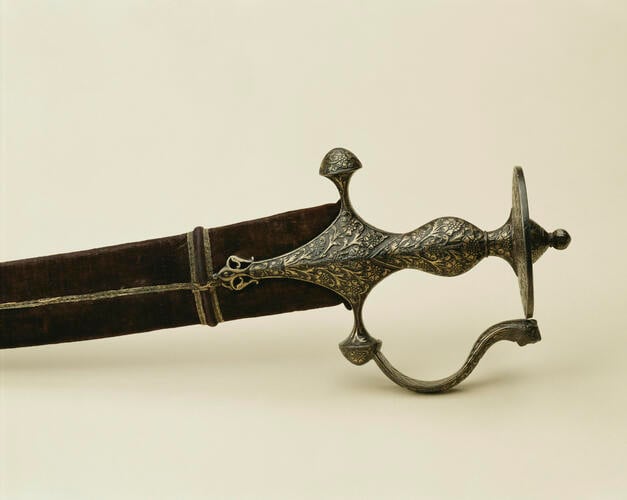
-
Dynastic Mughal blade with a later Talwar hilt and scabbard. The single edged curved blade has a forge-welded layered structure that may once have shown a pattern but is now polished white. The top third of the blade has been inlaid with calligraphic inscriptions in high-carat gold naming the Mughal Emperors Jahangir, Shah Jahan and Alamgir (Aurangzeb).
Jahangir had the blade inscribed with the Islamic profession of faith, though the first two words of the Koranic verse are concealed by the later hilt: '[There is no god] but God. Muhammad is the Messenger of God'. Next to this is the Persian name of the sword, Jahāngīr-Shāhī Ātashbār, “The Jahangirshahi Fire-Bearer”, enclosed within a panel.
The letters lam-sad-nun (L-S-N) in calligraphy may indicate a position on the celestial map corresponding to the place where the sword was made. Alternatively, they might denote the emperor's horoscope. The final epigraphic panel is an Arabic invocation to God: “He who makes Victorious”, Ya Fattah.
A Persian ode, composed and calligraphed by the Iranian poet and goldsmith Sa'ida-ye Gilani, who worked at Jahangir's court, reads:[Out of the water of] the sword of Jahangir Shah son of Shah-e Akbar
Instead of water there drips on combat day liquid fire
With his “Fire-Bearing” sword in enemy land
Of dust he swiftly pulls heads, from water there spring sparks.
May the flash from the lightning of his scimitar be bright
That the greatest illuminating sword may draw a mountain of light
As long as of our Age there is a trace, may comply with his wishes
The sky and the Aster, success and good fortune, conquest and victoryThe names of sword's succeeding owners, Shah Jahan and 'Alamgir (Aurangzeb), were added to the inscriptions by Sa'ida-ye Gilani during the subsequent reigns.
Shah Jahan had the following inscription added:
This is the personal scimitar of the Second Master of the Conjunction
The king fighter of the faith, the King of Land and Sea, Shah-e JahanThe iron-alloy hilt is of nineteenth-century Delhi type and is covered with carved flowers overlaid with gold, the knuckle-guard ending in tiger head. The later wooden scabbard is covered in brown velvet with a pierced silver chape decorated with flowers.
All transcriptions and translations credited to Assadullah Souren Melikian-Chirvani, 2023.
See:
Richard R Holmes and William Gibb, Naval & Military Trophies & Personal Relics of British Heroes. A series of water colour drawings (London, 1896), XXVII “Swords surrendered at Delhi by the King and Princes to Major Hodson”.
Susan Stronge (ed.), The Arts of the Sikh Kingdoms (London, 1999), p.213
Assadullah Souren Melikian-Chirvani, 'The "Fire-Bearing Sword of Emperor Jahangir: a Moghul dynastic heirloom' in Susan Stronge (ed.), The Great Mughals: Art, Architecture and Opulence (London, 2024).Provenance
Commissioned by the Mughal Emperor Jahangir (r.1605-27). Passed to his successor Shah Jahan (r.1628-58), and from him to Alamgir (Aurangzeb, r.1658-1707).
During the Indian Uprising, the sword was surrendered to Major William Stephen Raikes Hodson (1821-1858) of the East India Company Army by Bahadur Shah Zafar II, its final Mughal imperial owner. Following the surrender, Hodson was permitted to select two of the royal swords as his personal arms. This sword was specifically chosen as a presentation gift for Queen Victoria. However, Hodson was killed shortly afterwards at Lucknow, on 11 March 1858, so the swords were ultimately presented to the queen his widow, Susan.
A letter from Hodson to his brother, published in the Times on 22nd February 1858 recalls the surrender of Bahadur Shah and Hodson's acquisition of the swords:
'The old man [Bahadur Shah] then gave up his arms, which Captain Hodson handed to his orderly, still keeping his own sword drawn...' 'On proceeding to the General's [Wilson] quarters to report his successful return and hand over the royal arms, he was received with the characteristic speech, "Well, I’m glad you have got him, but I never expected to see either him or you again!"... He [Hodson] was requested to select for himself from the royal arms what he chose, and has therefore two magnificent swords, one with the name of "Nadir Shah," and the other the seal of Jehan Guire (sic) engraved upon it, which he intends to present to the Queen.' -
Creator(s)
(calligrapher)(nationality)Acquirer(s)
-
Medium and techniques
Steel, gold, copper, wood, leather
Measurements
93.0 cm (length)
80.0 cm (blade length)
Category
Alternative title(s)
Talwar and scabbard
Place of Production
India